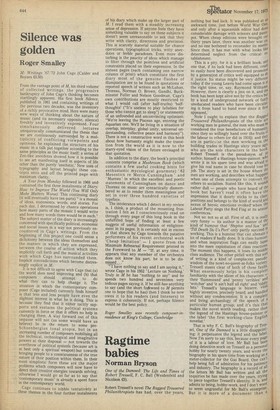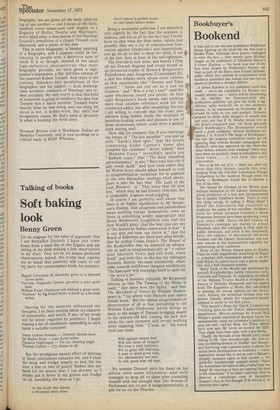Silence was golden
Roger Smalley
M: Writings '67-'72 John Cage (Calder and Boyars. £5.50) From the vantage point of Mo his third volume' of collected writings, the progressive bankruptcy of John Cage's thinking becomes startlingly apparent. His first book Silence, published in 1961 and containing writings of the previous two decades, was the inventory of a richly provocative mind. Here were many new ways of thinking about the nature of music (and its necessary opposite, silence) freshly and inventively expressed. Four
simultaneously delivered lectures unequivocally communicated the thesis that we are continuously surrounded by a multiplicity of conflicting viewpoints and opinions; he explained the structure of his music in a talk put together according to the same principles as the music itself; a series of Zen-like anecdotes showed how it is. possible to see art manifesting itself in aspects of life other than the purely 'aesthetic.' New uses of typography and layout brought these con4cepts onto and off the printed page with maximum clarity.
A Year from Monday followed in 1968 and contained the first three instalments of Diary: How to Improve The World (You Will Only Make Matters Worse). This continuing diary (it will eventually have ten parts) " is a mosaic of ideas, statements, words, and stories. For each day, I determined by chance operations how many parts of the mosaic I would write and how many words there would be in each." The subject matter pf the diary is increasingly concerned with specifically political, economic and social issues in a way not previously encountered in Cage's writings. From the beginning of this project one could sense a dichotomy between the ideas themselves and the manner in which they are expressed, between the course of action which they implicitly call forth and the musical activities with which Cage has surrounded them. Implicit contradictions which become distressingly explicit in M.• It is not difficult to agree with Cage that (a) the world does need improving and (b) that composers should attempt to do what they can to help change it. The situation in which the contemporary composer (Cage included) currently finds himself is that less and less people have even the slightest interest in what he is doing. This is because they find that it either tacitly supports and sustains the political systems currently in force or that it offers no help in changing them. A IiiaY forward out of this impasse will not (as some would have us believe) lie in the return to some preSchoenbergian tonal utopia, but in an increasing number of coniposers mobilising all the technical, technological and imaginative powers at their disposal — not towards the overthrow of political systenis (because art is at best only a spiritual weapon) but towards bringing people to a consciousness of the true nature of their position within them. In their most simplistic form these are the major problems which composers will now have to direct their creative energies towards solving, otherwise I would go as far as to say that 'contemporary music' is already a spent force in the contemporary world.
Cage continues to nibble tentatively at these themes in the four further instalments
of his diary which make up the larger part of• M. I read them with a steadily increasing sense of depression. If anyone feels they have
something valuable to say on these subjects it doesn't seem unreasonable to ask that they write with clarity, directness and precision. This is scarcely material suitable for chance
operations, typographical tricks, witty anecdotes or feeble .paradoxes. Even more dis
turbing is the paucity of ideas which manage to filter through the pointless and artificial constraints placed on their expression. In the sixteen pages (each containing one narrow column of print) which constitute the first diary most of the genuine flashes of illumination are to be found in quotations or reported speech Of writers such as McLuhan, Thoreau, Norman 0. Brown, Gandhi, Buckminster Fuller and Nelson Goodman. Cage's own contributions are mostly restricted to what I would call (after half-truths) 'halfthoughts' ("It's useless to play lullabies for those who cannot get to sleep") or statements of an unfounded and unconvincing optimism: "We're leaving the Piscean age, entering the Aquarian one. We'll be living in a situation of overlap, interplay, global Unity, universal understanding, collective peace and harmony"). There is not a constructive word in this book about how humanity might make the transition from the world as it is now to the starry-eyed vision of the future envisaged in that quotation.
In addition to the diary, the book's principal contents comprise a Mushroom Book (which contains a few useful cooking hints for enthusiastic mycological gourmets) 62 Mesostics re Merce Cunningham ' and ' Mureau ' in which the excellent and poetic statements of Cunningham on dance and Thoreau on music are syntactically dismembered so as to render them meaningless and set in over three hundred varieties of typeface. The intolerance which I detect in my review is, I think, a product of the mounting frustration I felt as I conscienciously read on through every page of this long book in the unfulfilled hope of finding at least a few nuggets of useful information or enlightenment in its pages. It is certainly not in excess of that shown by Cage towards the putative performers of his recent orchestral work 'Cheap .Imitation' — I quote from the Minimum n Rehearsal Requirement printed in the Foreword to M — "If, at any time, it appears that any member of the orchestra does not know his part, he is to be dismissed ..."
--19TETVe nothing to say and I am saying it," wrote Cage in his 1952 'Lecture on Nothing?. Truly in M he has "nothing to say" and he spends two hundred and seventeen very tedious pages saying it. If he still has anything to say (and the short fottword to M permits one to hope that he has) then I think he now owes it to his readers (and listeners) to express it coherently. If not, perhaps Silence would be the best policy.
Roger Smalley was recently composer-inresidence at King's College, Cambridge nothing but bad luck. It was published at all awkward time, just before World War One. and only after a squeamish editor had done
considerable damage with scissors and pastepot. When cheap editions were brought out thirty years later, there was another war on, and no one bothered to reconsider its merits. Since then, it has met with what looks like determined neglect from the critical establish men t .
This is a pity, for it is a brilliant book, and one that, if its luck had been different, could so easily have been discovered and promoted
by a generation of critics well equipped to dtt it justice. Its status might be very different
today if the young Leavis had come upon it at
the right time, or, say, Raymond Williarns. However, there is clearly a jinx on it, and the book has been kept alive not by the critics but by a kind of underground network of fair!). uneducated readers who have been circulat' ing it from hand to hand ever since it first appeared.' NoW I ought to explain that the Ragged Trousered Philanthropists of the title are
Working men in general, the men who must be considered the true benefactors of humanitY; since they so willingly hand over the fruits 0'
the labour to others (or did in 191Q); and they are in particular the men working in the building trades in Hastings sixty years age' who are the sole characters in the bolt. Robert Tressell is the pseudonym of ,g;s, author, himself a Hastings house-painter. way wrote it in his spare time and was afraid te give his real name in case he should lose Ins job. The story is set in the house Where the men are working, and describes what haPPetls when one of them attempts to convert the others to socialism. Stated like this, it souncl5 rather dull — people who have heard of the book but haven't read it often have the impression that it dourly sticks to its class; positions and belongs to the kind of world art' nexus of heroic emotions evoked^when thei Labour Party sings the Red Flag at its annul' conferences. Not so: not so at all. First of all, it is reallY very funny — its author is a master of thed kind of humour that 'Steptoe and Son' art 'Till Death Do Us Part' -only partly succeed working. This is a humour that can alienate lot of readers if badly done. It is class humour, and when inspiration flags can easily lapse into the mere exploitation of class reactions. The moment this happens, it loses its middle class audience. The other pitfall with this sort of writing is a kind of complacent pseudowisdom of the nowt-so-queer-as-folks varietY. Tressell steers clear of both of these faults. What enormously helps is his complete familiarity with the idiom of his characters their 'flummoxed' and 'penny 'orribles' afl 'wotcher' and 'it ain't half all right' and 'tiddlY, bits.' Tressell's language is bizarre, vital. highly inventive, precisely heard, and handled without any condescension. It is a complete and living archaeology of the speech of a particular human group; and it's this that makes the novel worth reading, rather than the legend of the Hastings house-painter nr the label 'the first working-class English novelist.' That is why F. C. Ball's biography of Tres' sel, One of the Damned is a little disappoint' ing: it perpetuates the legend and the label. Now I'm sorry to say this, because every Page of it is a labour of love. Mr Ball has been doing detective-work on Tressell as a personal hobby for nearly twenty years, and wrote the biography in his spare time from working as meter-collector for the Gas Board. One can help being full of admiration for his patience and industry. The biography is a record of all the letters Mr Ball has written and all the inquiries he has made over the years, trying, to piece together Tressell's identity. It is, ant: admits to being, hobby-work, and I don't war". to seem ungrateful for Mr Ball's enterprise' But it is more of a document than a
biography: we are given all the facts, piled on top of one another — and I mean all the facts, unsifted, every tiniest post card inquiry to a Registry of Births, Deaths and Marriages, every blind alley, a description of the Hastings Council's demolition of a chapel Tressell once decorated, and a photo of the pier.
This is naive biography, a Sunday painting of a biography, and I suppose could be fascinating to people with a detective turn of mind. It is as though, instead of the usual high-definition photoportrait that most biography provides, we were given a signpainter's impression, a flat, full-face version of the essential Robert Tressell. And there is the curious, Nabokov-like parallelism of the biographer and his subject — both workingclass novelists, residents of Hastings, and ardent socialists. My only worry is that this kind of treatment is going to reinforce the idea that Tressell was a naive novelist. Tressell knew exactly what he was doing, and one thing his novel is not, is hobby-work. But until real recognition comes, Mr Ball's kind of devotion is what is keeping the book alive.
Norman Bryson was a Harkness Fellow at Berkeley University, and is now working on a critical study of Edith Wharton.



































 Previous page
Previous page